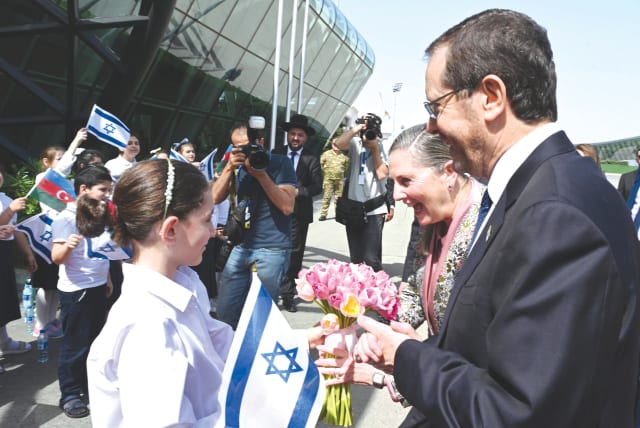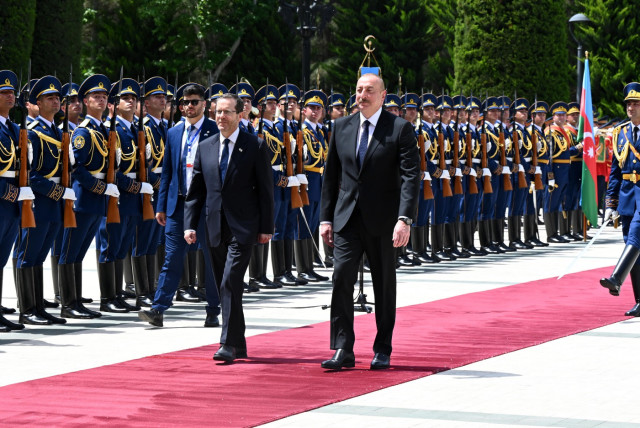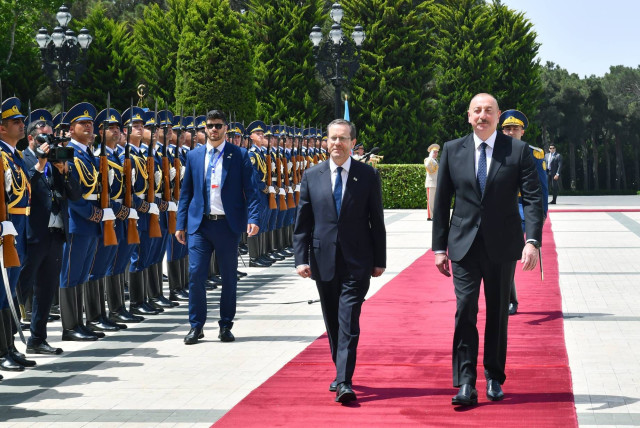Herzog's Azerbaijan trip highlights other side of Israel-Baku ties

DIPLOMATIC AFFAIRS: The presidents and the ambassador may have wanted to shift focus away from defense, but it plays a huge role in ties between the countries.
The relationship between Israel and Azerbaijan is “not just Iran and defense; it’s also about trade, tourism and energy,” President Isaac Herzog insisted at a briefing wrapping up his visit to the republic’s capital, Baku, on Wednesday.
Yet, with unusually tight security out of real concern about disruptions, and with the International Atomic Energy Agency making news during the visit, the Iranian threat overshadowed the other aspects of the trip.
The trip came as ties between Jerusalem and Baku grew closer; after 30 years of relations, Azerbaijan opened an embassy in Israel for the first time earlier this year.
The visit started like many others: Herzog was met by an honor guard at a special terminal of Baku’s airport, as well as by children from the local Chabad school singing and waving Israeli and Azerbaijani flags.
Herzog’s motorcade sped down the highway to Azerbaijani President Ilham Aliyev’s dacha in the Baku suburb of Zagulba. The building, constructed in 2008, looks like a fairly typical European presidential palace from the outside, and has marble floors and columns and crystal chandeliers on the inside, with a beautiful view of the Caspian Sea from its balconies.
The presidents held a one-on-one meeting, and then one with their teams seated at a long table. After that came an official lunch, with special kosher meals for Health and Interior Minister Moshe Arbel, Azerbaijani rabbis and others, which looked almost exactly like what everyone else was eating.
Media or no media?
Herzog, Aliyev and their wives stopped at every table to say hello and exchange a few words, including at the journalists’ table. Only Israeli media were at the lunch, and that was the result of a battle highlighting the difference between press relations in liberal democracies versus authoritarian systems. According to sources in the delegation, Aliyev’s staff did not want journalists at the lunch, while Herzog, who has honed such open and friendly relations with the media in 20 years in politics to the extent that he still exchanges WhatsApp messages with journalists as president, insisted that they be in the room. The compromise was that no photos were allowed.
When the presidents made statements to the press, they both had a lot to say about everything but Iran, but the Islamic Republic still loomed large.
Logistics are not usually the most interesting part of a presidential visit, but the restrictions on the delegation revealed how great the concern was that Iran, which shares a 670-km. border with Azerbaijan, would find a way to attack or spy on the group.
Everyone in the delegation – diplomats, staff, journalists – were warned that they must follow the schedule and not leave the hotel on their own, even when there were hours in which they could have done some touring or checked out the nightlife. It was like the COVID-19 bubbles of past government delegations abroad, except that the pandemic is over.
In addition, security on the trip took the highly unusual step of telling everyone to keep their phones totally disconnected from any local network, on airplane mode with Bluetooth and NFC turned off. Each member of the delegation was given a personal router as the only way to connect with the outside world; the online advertisements this reporter saw indicated that the router had a VPN that made the Internet think she was in Thailand, not Azerbaijan.
Iran is not just a threat to Israeli delegations in Baku
Yet, Iran is not just a threat to Israeli delegations in Baku. In a briefing to reporters, Herzog said that Baku is “aware of Iranian hostility towards it, going back to the establishment of the state.”
“Just a visit by an Israeli leader here makes a statement” to Iran, a source in Herzog’s delegation said. That being said, “no country wants to be made out to be the secret weapon against Iran.”
Israeli Ambassador in Baku George Deek explained to The Jerusalem Post Podcast that Azerbaijan is “in a very strategic position” bordering on both Russia and Iran.
“I think both of our countries understand that Iran is a strategic threat,” the ambassador added. “It’s a long-term as well as short-term threat to the security and the well-being of both our countries. And I think that puts us in a special position to understand the importance of having this relationship that we have built continue to grow.”
Tensions between Azerbaijan and Iran rose in recent months.
“An Iranian stormed the Embassy of Azerbaijan in Tehran on January 27, ironically on International Holocaust Remembrance Day, and killed one of the security guards, almost killing the rest of the diplomats and their families,” Deek said. “Luckily, someone jumped on him [and with his] bare hands stopped him from continuing this massacre.
“In March, a member of parliament who was very vocal against Iran here in Azerbaijan was shot outside his house. The Azerbaijani authorities has said that [the shooter] was guided by Iranian elements,” the ambassador said.
Each president had a different element that he left totally unsaid in their statements to the press before lunch at the dacha. While Herzog said “the Iranian threat is something we discussed in depth,” Aliyev kept mum. Aliyev sang the praises of Israel’s defense industry, the source of 69% of his country’s arms imports in 2016-2020, but Herzog had nothing to say about it.
Aliyev mentioned recent cooperation on cybersecurity, saying “the experience of Israeli companies in this area will be helpful to us,” and praised the “long-lasting cooperation in the area of defense industry.
“Azerbaijan has access to Israeli equipment for many years that allows us to modernize our defense capability and allows us to defend our statehood, our national interests and our territorial integrity,” he added.
Azerbaijan reportedly used Israeli drones in the war with Armenia in 2020, and Aliyev posed next to the UAVs after Iran’s foreign minister accused Baku of allowing Israel to establish bases in Azerbaijan.
As for Jerusalem’s silence about its arms sales to Baku, Deek said he cannot comment on the defense industry, but “it is no secret that the Azerbaijanis take great pride in that aspect of our relations. And I think they attribute it to the friendship that we have between our countries.
“When you face a mutual threat, then you also work in coordination and you try to help each other facing those threats,” he said.
AT THE same time, the presidents tried to deemphasize defense issues.
Both underscored in their statements the theme of coexistence between Azerbaijan’s Shi’ite Muslim majority and its Jewish community, which dates back at least to the eighth century. The community includes Mountain Jews, the oldest community whose traditions say they are descendants of the Ten Lost Tribes; Ashkenazi Jews who began migrating to the area in the 19th century to work in the oil business; and Jews who started to migrate from neighboring Georgia at the turn of the 20th century.
The Jewish community is “a big asset in our country,” Aliyev said in near-perfect English, honed in a top Moscow university as befitting the son of a Soviet bigwig. “Jewish citizens of Azerbaijan contributed a lot to the modern development of our country. There is no division between us. We have a centuries-long history of interaction, friendship and mutual support....These are cultural bridges between our countries.”
Herzog, who met with Jewish community leaders on the second day of his visit to Baku, spoke of “the roots of special Jewish heritage in this country” and “a shared vision based on doing good through open and honest dialogue between Jews and Muslims.
“It is no secret that your state is Muslim... and still the love that there is between our states is an example of how we can change the world and move forward,” he added.
Azerbaijan’s Ambassador to Israel Mukhtar Mammadov emphasized later in the trip that his country is secular, with a separation of religion and state, even if there is a Muslim majority.
Also taking part in the visit was Rabbi Marc Schneier, president of the Foundation for Ethnic Understanding, who has extensive ties with leaders of Muslim and Arab states around the world. Schneier said that of over 50 Muslim-majority states in the world, Azerbaijan is the most supportive of its Jewish community and Israel.
Beyond the Jewish connection, Aliyev talked up cooperation with Israel in agriculture and irrigation. Azerbaijan supplies over a third of Israel’s crude oil, but the president called to diversify and increase trade between the countries. He also sought to increase the direct flights between the countries from four in order to encourage more tourism from Israel.
The trip was meant “to improve the bilateral relations and to diversify them from energy and security to the more civilian fields, like trade and culture and commerce and tourism,” Deek told the podcast.
Israel Aerospace Industries won a $120 million tender to build satellites for Azerbaijan; Israel’s national water company, Mekorot, is writing a strategic plan for Azerbaijan, which is facing a severe water drought; Israeli IDE Technologies is building Azerbaijan’s first desalination plant; and 50-70 Azerbaijani students are set to study agriculture in Israel each year, Deek said.
“One of my sources of frustration as an ambassador of Israel here is that when Israelis come here, they only talk about defense issues, whereas I think the potential between us is so much more,” he added.
Still, the Iranian issue remained in the ether. During the two days of Herzog’s visit, Tehran announced during the trip that the IAEA is going to close some of its probes into Iran’s nuclear program; soon after, the Post and other outlets were able to confirm the report. Plus, US Special Envoy for Iran Rob Malley told NPR that Iran is only a “couple of weeks” away from attaining weapons-grade uranium.
The presidents and the ambassador may have wanted to shift focus away from defense, but it plays a huge role in ties between the countries. As a local reporter covering the embassy’s event honoring 75 years since Israel’s establishment said, when asked what she thought about Israel-Azerbaijan relations: “We like your Harop drones. Your military – very good.”
Jerusalem Post Store
`; document.getElementById("linkPremium").innerHTML = cont; var divWithLink = document.getElementById("premium-link"); if (divWithLink !== null && divWithLink !== 'undefined') { divWithLink.style.border = "solid 1px #cb0f3e"; divWithLink.style.textAlign = "center"; divWithLink.style.marginBottom = "15px"; divWithLink.style.marginTop = "15px"; divWithLink.style.width = "100%"; divWithLink.style.backgroundColor = "#122952"; divWithLink.style.color = "#ffffff"; divWithLink.style.lineHeight = "1.5"; } } (function (v, i) { });


